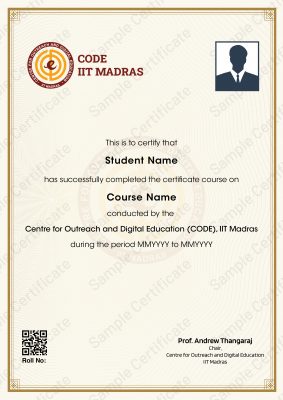MODULE - 1 : Essentials of Sustainability
Faculty Incharge:
Prof. Sathyanarayanan Seshadri, Dept. of Applied Mechanics and Biomedical Engineering, IIT Madras
Dr Charuta Kulkarni, Principal Scientist, School of Sustainability, IIT Madras
Prof. Venkatraman Srinivasan, Dept. of Civil Engineering, IIT Madras
Prof. Indumathi Nambi, Dept. of Civil Engineering, IIT Madras
Dr Kaushal Kumar Jha, Adjunct Faculty, Dept. of Engineering Design, CEO, Center for Excellence in Energy and Telecommunications (CEET), IIT Madras
Dr Rahul Muralidharan, R & D Specialist, The Energy Consortium, IIT Madras
Dr Christoph Woiwode, Visiting Professor, Indo-German Centre For Sustainability, IIT Madras
About the Module:
This introductory module speaks about the nuts and bolts of Sustainability and dives into the concept of circularity in the context of today’s world. It scaffolds into brainstorming why sustainability makes sense for the businesses, helping shape the mindset essential for ideating real-world sustainable business strategies.
Concepts Covered :
- What is sustainability and what is not sustainability?
- Climate Change, Risks, Adaptation
- Water Resources and Management
- Waste Management and Circular Economy
- Renewable Energy and Energy Efficiency
- Natural Resource Management
- Socio-cultural Dimensions and Resources for Sustainable Transformations
Learning Outcomes:
- Introduction to Sustainable Development Goals (SDGs) and role of corporates in achieving SDGs
- Systemic view into sustainability
- Right mindset for all-round sustainable business strategy
MODULE - 2 : Sustainability in the Corporate Ecosystem
Faculty Incharge:
Prof. Ashwin Mahalingam, Dept. of Civil Engineering, IIT Madras
Mr Madhavan Nampoothiri, Dept. of Management Studies, IIT Madras & Co-Founder, NordESG, Germany.
Dr Parama Roy, Adjunct Faculty, Dept. of Civil Engineering, IIT Madras
Executive Director, Okapi Research and Advisory Pvt Ltd
Dr Rahul Muralidharan, R & D Specialist, The Energy Consortium, IIT Madras
About the Module:
Starting with making sustainability as business case, the module provides a critical review of the existing sustainability frameworks (e.g. ESG). The module unfolds the Corporate Scenario Analysis toward climate-related risks and opportunities as an intrinsic mechanism, thereby making a way for weaving external mechanisms in implementing sustainability.
Concepts Covered:
- Business Case for Sustainability
- ESG Assessment
- Corporate Scenario Analysis
- Extrinsic Sustainability Scenarios including Public Private People Partnerships; Small-Medium Enterprises and Grassroot-level Innovations
Learning Outcomes:
- Sustainability-profitability trade-offs and synergies
- How can we measure sustainability better using existing frameworks, both quantitatively and qualitatively?
- How fine-tuning intra-organizational policies can make a way for implementing external and socially-just means of implementing sustainability?
MODULE 3 : Measuring, Reporting and Re-assessing Sustainability
Faculty Incharges:
Mr Raghuttama Rao, CEO, Gopalakrishnan-Deshpande Centre for Innovation & Entrepreneurship, IIT Madras
Prof. Santosh Kumar Sahu, Dept. of Humanities and Social Sciences, IIT Madras
Prof. Rajnish Kumar, Dept. of Chemical Engineering, IIT Madras
Mr E. Nandakumar, CEO, International Centre for Clean Water, IIT Madras
About the Module:
This module’s delivery is rooted in the geopolitical context of India and its shifting Policy Landscape that, in turn, has implications for industries. The discussion goes on introducing upcoming toolkits toward environmental measurement frameworks and gets into the mechanics of environmental economics, thinking aloud its limitations and ways forward
Concepts Covered:
- State and Fate of Reporting Frameworks - Why is it essential to go beyond the existing ESG reporting frameworks?
- Where is India in terms of defining climatic and environmental goals and what are its business implications?
- Environmental Policies and Practices
- Carbon and Water Footprint Measurement Frameworks
Learning Outcomes:
- Existing and upcoming frameworks for measuring and reporting sustainability
- India’s Policy Landscape
- Environmental assessments
- Elements of environmental economics
MODULE 4 : Sustainability Toolkit
Faculty Incharges:
Prof. Ashwin Mahalingam, Dept. of Civil Engineering, IIT Madras
Prof. Vinu R, Dept. of Chemical Engineering, IIT Madras
Prof. Sivakumar Palaniappan, Dept. of Civil Engineering, IIT Madras.
Prof. Ravindra Gettu, Dept. of Civil Engineering, IIT Madras
Prof. Sathyanarayanan Seshadri, Dept. of Applied Mechanics and Biomedical Engineering, IIT Madras
About the Module:
As the name suggests, the module offers the toolkit for ideating Sustainability pathways from cradle-to-grave. It deep dives into Life Cycle Assessment (LCA) using real-world examples from multiple sectors.
Concepts Covered:
- Life Cycle Assessment (LCA): Significance, Stages, Tools, Challenges
- Examples from industries including biofuels, buildings, materials, energy technologies
Learning Outcomes:
- What is LCA?
- How is LCA done?
- What are the different LCA tools and approaches that can be used to assess sustainability?
- Peer-learning through industry-specific case studies
MODULE 5 : Sustainability Worldview
Faculty Incharges:
Prof. Sathyanarayanan Seshadri, Dept. of Applied Mechanics and Biomedical Engineering, IIT Madras
Prof. Rajnish Kumar, Dept. of Chemical Engineering, IIT Madras
About the Module:
The modules 5 and 6 are embedded with hands-on strategies on actioning Sustainability in the respective business settings. It will help put Sustainability in context of Indian and global scenarios to the extent that can positively influence the process of ideating, planning, implementation, and troubleshooting. The module also consolidates an update of reporting frameworks and discusses Business Responsibility and Sustainability Reporting (BRSR) as part of India’s fight against climate change
Concepts Covered:
- Case Studies from the Developed and Developing Worlds
Learning Outcomes:
International and national view into sustainable management
MODULE 6 : Actioning Sustainability
Faculty Incharges:
Mr Raghuttama Rao, CEO, Gopalakrishnan-Deshpande Centre for Innovation & Entrepreneurship, IIT Madras
Prof. Ashwin Mahalingam, Dept. of Civil Engineering, IIT Madras
About the Module:
The modules 5 and 6 are embedded with hands-on strategies on actioning Sustainability in the respective business settings. It will help put Sustainability in context of Indian and global scenarios to the extent that can positively influence the process of ideating, planning, implementation, and troubleshooting. The module also consolidates an update of reporting frameworks and discusses Business Responsibility and Sustainability Reporting (BRSR) as part of India’s fight against climate change
Concepts Covered:
- Crafting a Sustainable strategy for your business: selecting relevant framework(s); delineating Key Result Areas/Key Responsibility Areas; identifying periodic review and troubleshooting mechanisms
- Business Responsibility and Sustainability Reporting (BRSR)
- Carbon markets
- India’s performance in climate in fighting climate change
- Review of Best Sustainability Practices
Learning Outcomes:
- Peer-learning through industry-specific case studies
- Development of action items for effectively implementing sustainable pathways in the view of upcoming Sustainability frameworks for India



Reviews
There are no reviews yet.